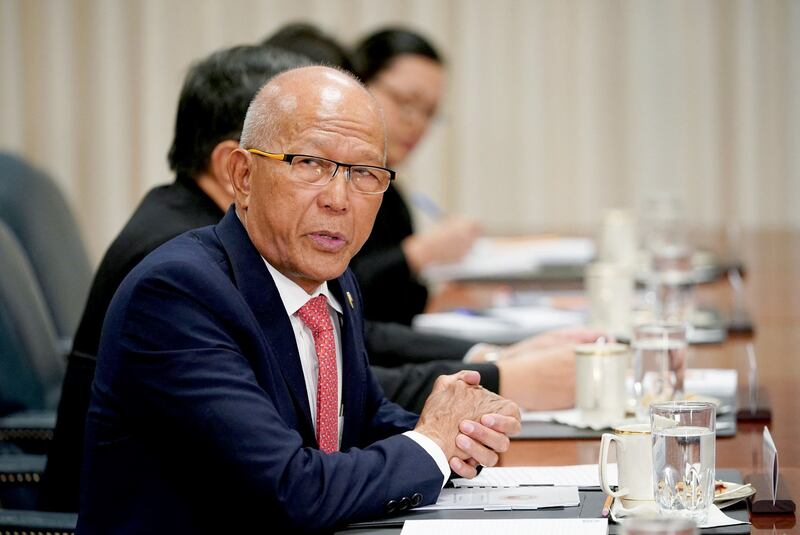Countries bordering the South China Sea who are wary of great power rivalries are reacting slowly and cautiously to the announcement of a trilateral defense pact between the United States, the United Kingdom and Australia.
The AUKUS pact, hailed by leaders from the three powers as “historic,” is thought to be designed to counter China’s growing influence in the Indo-Pacific, especially in the South China Sea where China holds sweeping claims that are disputed by its neighbors.
The pact will also see the US and UK give Australia the technology to build nuclear-powered submarines.
The pact has been denounced by China, which claims it will stoke an arms race, and other critics speculate it may provoke a new Cold War. Tensions have been building up in the region over territorial disputes, as China develops its military might.
Southeast Asian countries have responded cautiously to AUKUS – an abbreviation of the three participating nations – amid concerns of a new, intense strategic rivalry in the Indo-Pacific.
“Many regional countries do not want to be drawn into U.S.-China rivalry," Rizal Sukma, a senior researcher at the Jakarta-based Centre for Strategic and International Studies (CSIS) and former Indonesia ambassador to Britain, told BenarNews, an RFA-affiliated online news service.
AUKUS was announced early Asia time on Thursday. China wasted no time in registering its disapproval. Chinese foreign ministry spokesman Zhao Lijian called the pact “extremely irresponsible” and said it would backfire on the three powers involved.
He said they had "seriously undermined regional peace and stability, intensified the arms race, and undermined international non-proliferation efforts."
Among the 10 members of the Association of Southeast Asian Nations (ASEAN), Singapore reacted positively, but other governments were more guarded.

Arms race concerns
The Indonesian Foreign Ministry said Friday it “is watching with caution” the Australian government's decision to acquire nuclear-powered submarines. Indonesia is one of Australia’s closest neighbors and even though the country is not a territorial claimant in the South China Sea, its exclusive economic zone overlaps China’s claims.
Indonesia is “very concerned about the continued arms race and projection of military power in the region”, a ministry statement said.
Jakarta “encourages Australia and other related parties to continue promoting dialogue in resolving differences peacefully” and urges other parties in the region to adhere to international law, including the 1982 United Nations Convention on the Law of the Sea.
Indonesia was among the first nations in the Indo-Pacific to be informed of the new AUKUS deal and Australian Prime Minister Scott Morrison reportedly said he’d seek to speak to President Joko Widodo “soon.”
Philippines Defense Secretary Delfin Lorenzana has also held a phone conversation with his Australian counterpart Peter Dutton on Friday, in which Dutton “underscored that Australia wants to be seen as a neighbor that promotes regional peace”, according to the Philippine Department of Defense.
Lorenzana told Dutton that his country “would like to maintain good bilateral defense relations with all other countries in the region”, suggesting that officially Manila doesn’t want to be seen as taking sides.
A lack of a solid regional security structure means that Southeast Asian countries risk being sidelined on their own strategic chessboard. ASEAN, established 54 years ago, has become lacklustre and “more irrelevant,” according to Sukma who said he doubted that the grouping “has the capacity to be a place where great powers' interests can be managed.”
Most Southeast Asian governments including Malaysia, Thailand and Vietnam have yet to comment on AUKUS – hinting at the prevailing strategic uncertainty in the region.
Singapore, however, was upbeat.
Its Ministry of Foreign Affairs quoted Prime Minister Lee Hsien Loong who said in a phone call with Australian premier Morrison that he hoped the new deal would “contribute constructively to the peace and stability of the region and complement the regional architecture.”
'China reaps what it sows'
Lee’s statement suggests that there may be much more support in the region for having a deterrent, military presence than openly claimed.
“No one country in the region wants to be under the domination of China and the U.S. presence is thus a necessity,” said Kasit Piromya, Thailand’s former minister of foreign affairs.
In the last 40 years, China has become the second-largest economy in the world and makes gains in technological advancement. However, “the current Chinese leadership has become revisionist with assertive and aggressive ambition,” argued Kasit.
In his opinion, “the ball is more in the Chinese court whether China wants to keep on continuing to dominate the region or to take stock of the limitation of power and the resources to back up the power.”
“The United States has more allies while China only has a marriage of convenience with Russia,” he said.
Apart from the new tripartite alliance, the U.S is also part of an Indo-Pacific security grouping known as the Quad, together with Australia, India and Japan. President Joe Biden will be hosting a summit of the Quad leaders in Washington, D.C., next week.
“The U.S.-led alliances are playing an important role in countering and containing China’s assertiveness”, said Nguyen Ngoc Truong, a former Vietnamese ambassador and well-known political affairs analyst.
Vietnam has been making effort to balance the relationships with both China and the U.S. with the country’s leaders always insisting that they would not side with any country against China.
Yet Vietnam and China are embroiled for years in a tense territorial dispute in the South China Sea and AUKUS should bring “a new confidence to countries contesting China’s excessive claims,” according to the former Vietnamese diplomat.
“Beijing may become even more aggressive. But China reaps what it sows.”
Ahmad Syamsuddin and Tria Dianti in Jakarta and Jason Gutierrez in Manila contributed to this report by BenarNews, an RFA-affiliated online news service.
